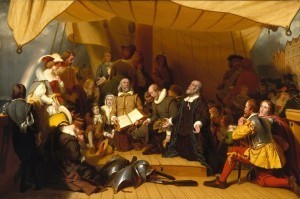Fearless Optimism: The Story of the Geneva Bible

The Embarkation of the Pilgrims painting was commissioned in 1836 by the US Govt for the Capitol Rotunda. (Note the open Geneva Bible in the hands of John Robinson.)
The struggle between tyranny and liberty today in America is at a critical tipping point. Yet the force that transformed the world still holds the solutions for our crises. The road to liberty has never changed.
The Geneva Bible has been the lost treasure of Christianity for over four hundred years. Nearly forgotten by the modern world, this version of the Holy Scriptures was translated and compiled by exiled reformers in Geneva (1557-1560) and stands alone in history as the force that transformed the English speaking world from the backwater of history into the center of civilization.
England in 1557 was a society beset by illiteracy, oppression, even barbarity. Hundreds of men had been burned at the stake merely for reading and teaching the Bible. Many clergymen, both Catholic and Protestant, received their parish jobs as payoffs and often were incapable or unwilling to preach. The impoverished and spiritually discouraged masses found solace outside of the church — in sloth and debauchery. The upper classes compromised their conscience and virtue to cater to the elites of the royal court.
Into this seemingly hopeless culture of corruption and error, the light of God’s written Word—in the newly translated, published, and distributed Geneva Bible— began to liberate the English-speaking people, penetrating hearts and transforming minds. The Geneva Bible was the most significant catalyst in the transformation of England, Scotland, and America from slavish tyranny to the heights of Christian civilization. By the time of the defeat of the Spanish Armada in 1588, just twenty-eight years after the first printing of the Geneva Bible, it was already being said of the English that they were becoming a “People of the Book.”
As the first Bible to be read by the common people in English, the Geneva Bible inspired self-government, free enterprise, education, and limited constitutional government, protection of women and children, and godly culture. John Knox preached with power from the Geneva Bible at St. Giles Cathedral in Edinburgh, mightily influencing Scotland’s restoration from clan-dominated, semi-pagan barbarity to Christian faith and liberty. And it was the Geneva Bible that was carried and read by the Pilgrims as they landed in the wilderness of America. They extrapolated concepts of self & civil government from its pages as they laid the foundations of the world’s first constitutional republic since the time of Moses.
For more than 1,500 years the spread of the Gospel in the world was hindered. Not until there was a reliable, written version of God’s Word in the common language of the people could the Gospel be spread throughout the world. The providential invention of movable type, enabling not just the publication but the practical distribution of the Geneva Bible, freed God’s Book to enter hearts and homes of everyday people. Now, for the first time in history, every believing family could teach the whole council of God to their children.
The marginal notes of the Geneva Bible present a systematic Biblical worldview centered on the Sovereignty of God over all of His creation including churches and rulers. For example, the marginal note in the Geneva Bible for Exodus 1:19 indicates that the Hebrew midwives were correct to disobey their ruler. Dozens of similar Geneva Bible notes clarify the limited power of civil authorities and the rights and duties of individuals to resist tyranny. These notes infuriated King James I of England. He called such interpretations “seditious.” The tyrant knew that if the people could hold him accountable to God’s Word, his days as a king ruling by the “divine right” myth were numbered. Thus did the Geneva Bible begin the unstoppable march to liberty in England, Scotland, and America.
The marginal notes of the Geneva Bible also served to liberate believers from the ignorance, heresy, and tyranny of the Middle Ages. Calvin, Knox, and other Reformers, taught in these notes the central doctrines of Sola Scriptura—the Word of God alone, inspired and directional for our lives and culture; Sola Fide—faith alone as the only means of justification before God; Sola Christus— Christ alone as mankind’s only mediator, lord, and king; Sola Gratia—grace alone as the only hope of salvation and sanctification; and Soli Deo Gloria— God alone, not king nor pope, to receive the glory He is due in heaven and on earth.
When the Geneva Bible and its commentary were systematically taught and applied to life, entire nations and societies were transformed. Ultimately, the knowledge of and obedience to God’s written Word led to constitutional, limited government; the end of slavery and the caste system; free enterprise and the concept of private property; the biblical work ethic that fueled the scientific and industrial revolutions; wholesome, uplifting standards in the arts; and many other forms of progress.
The bold innovations of the Geneva Bible continue to have an impact in today’s world. Because of its revolutionary format and features, the Geneva Bible became the foundation for what we call group Bible study and was a catalyst for the acceptance of the liberating doctrine of the “priesthood of all believers.” Godly pastors expounded the Word and other believers offered commentary and invited discussion—all of which, today, might be taken for granted; but such practices had been strictly prohibited for one thousand years!
Almost five hundred years later, our culture is once again desperate for the Truth. Many people have forgotten, abandoned, or rejected the great lessons of the Reformation and the Biblical theology that inspired the greatest accomplishments of Western Civilization, freedom and prosperity.nnovations of the Geneva Bible continue to have an impact in today’s world. Because of its revolutionary format and features, the Geneva Bible became the foundation for what we call group Bible study and was a catalyst for the acceptance of the liberating doctrine of the “priesthood of all believers.” Godly pastors expounded the Word and other believers offered commentary and invited discussion—all of which, today, might be taken for granted; but such practices had been strictly prohibited for one thousand years!
As we read this sacred volume, let us remember the sacrifice of the persecuted scholars on the shores of Lake Geneva. John Calvin, in exile in Geneva, surrounded by pagan kings, wars, and a corrupt Roman church, said these optimistic words about the spread of God’s Word: “Whatever resistance we see today offered by almost all the world to the progress of the truth, we must not doubt that our Lord will come at last to break through all the undertakings of men and make a passage for His Word. Let us hope boldly, then, more than we can understand; He will still surpass our opinion and our hope.
May we be inspired from His Word, as our spiritual forbears were, to be fearlessly optimistic about the power of His Gospel and the furtherance of His Kingdom on earth.
“For unto us a child is born, and unto us a Son is given: and the government is upon his shoulder, and he shall call his name, Wonderful, Counselor, The mighty God, The everlasting Father, The prince of peace. The increase of his government and peace shall have none end: he shall sit upon the throne of David, and upon his kingdom, to order it, and to establish it with judgment, and with justice, from henceforth, even forever: the zeal of the Lord of hosts will perform this.” (Isaiah 9: 6-7, Geneva Bible).
-Marshall Foster
Marshall Foster's Blog
- Marshall Foster's profile
- 28 followers



